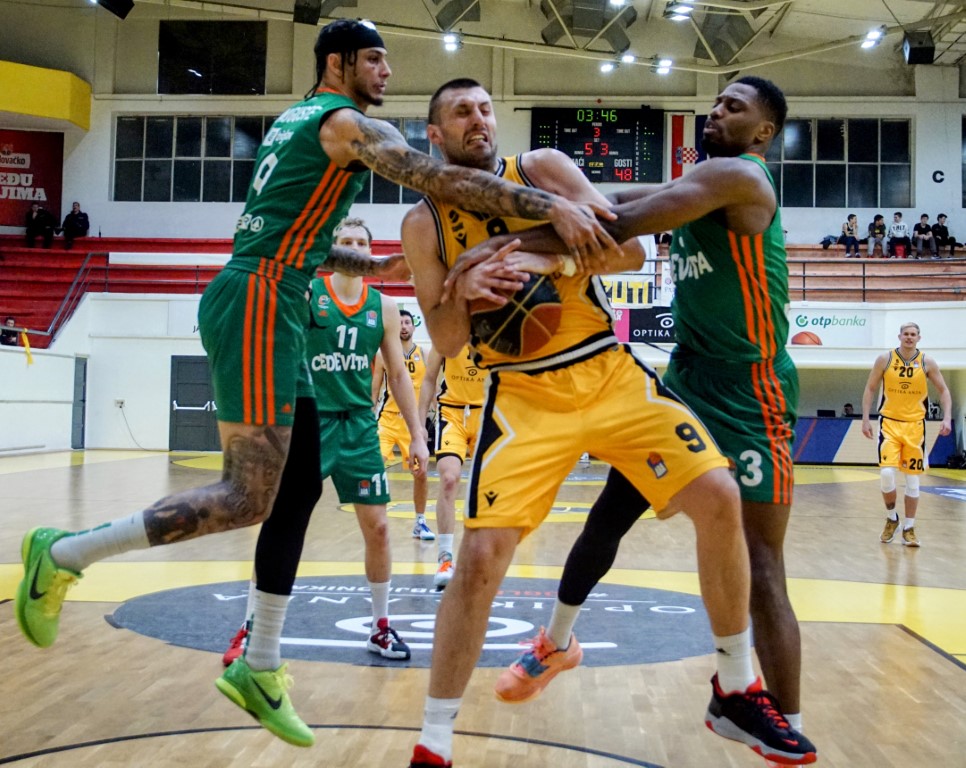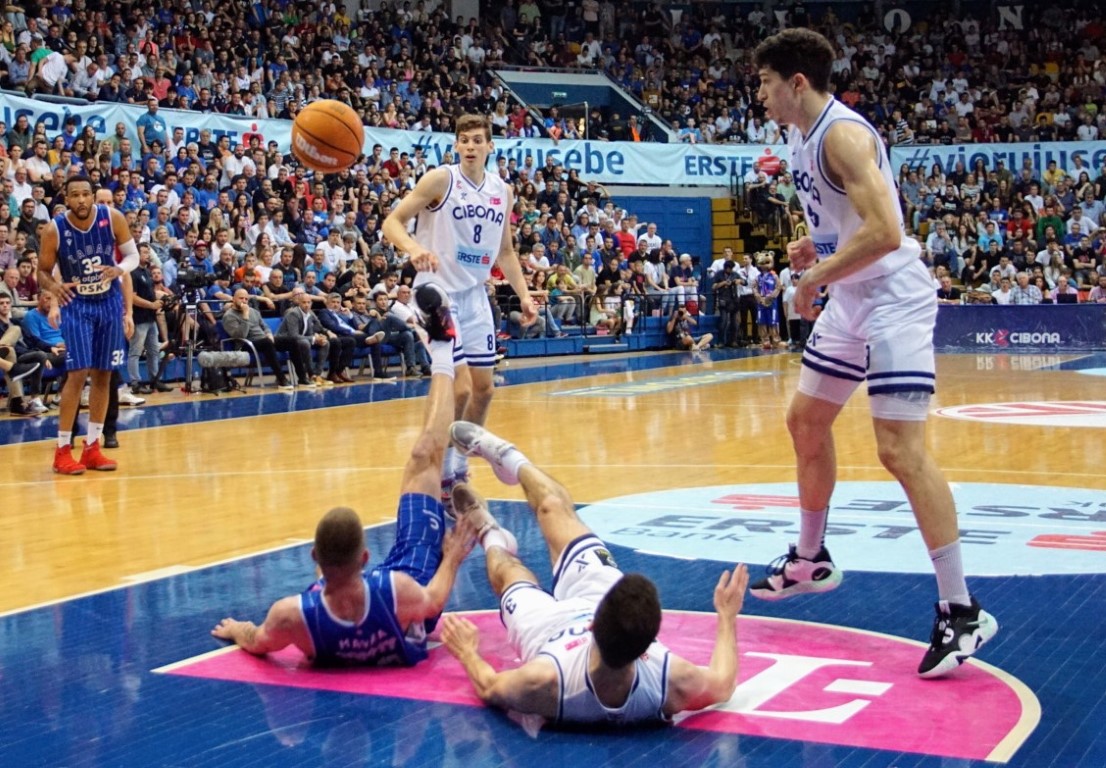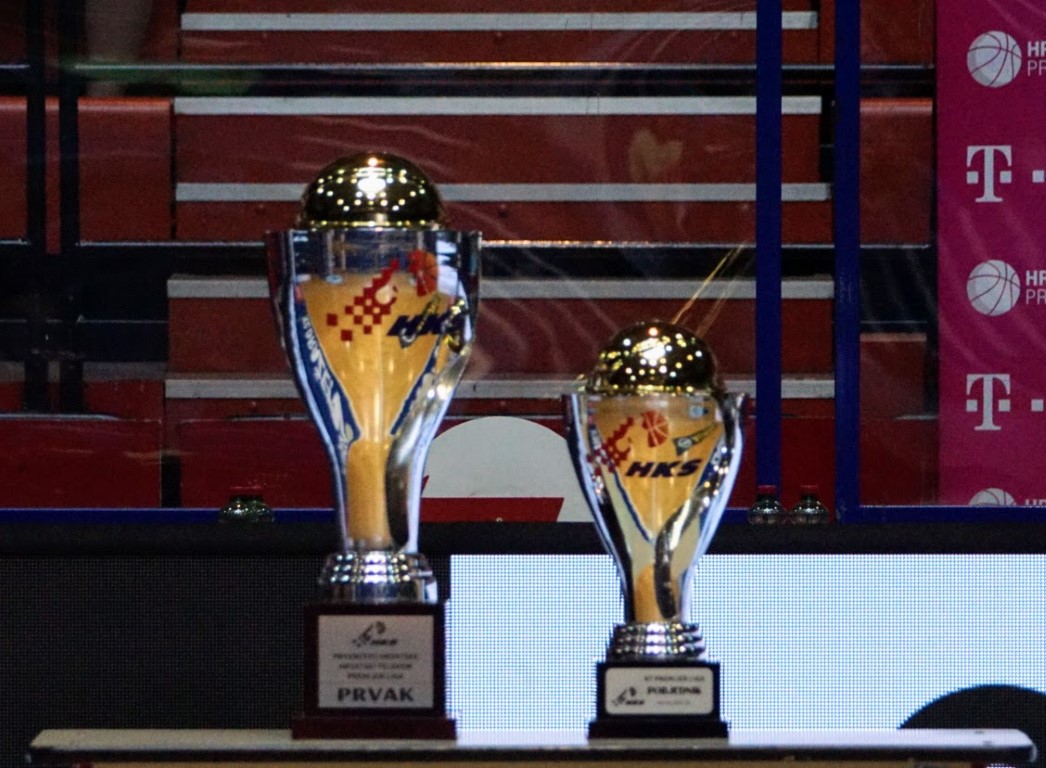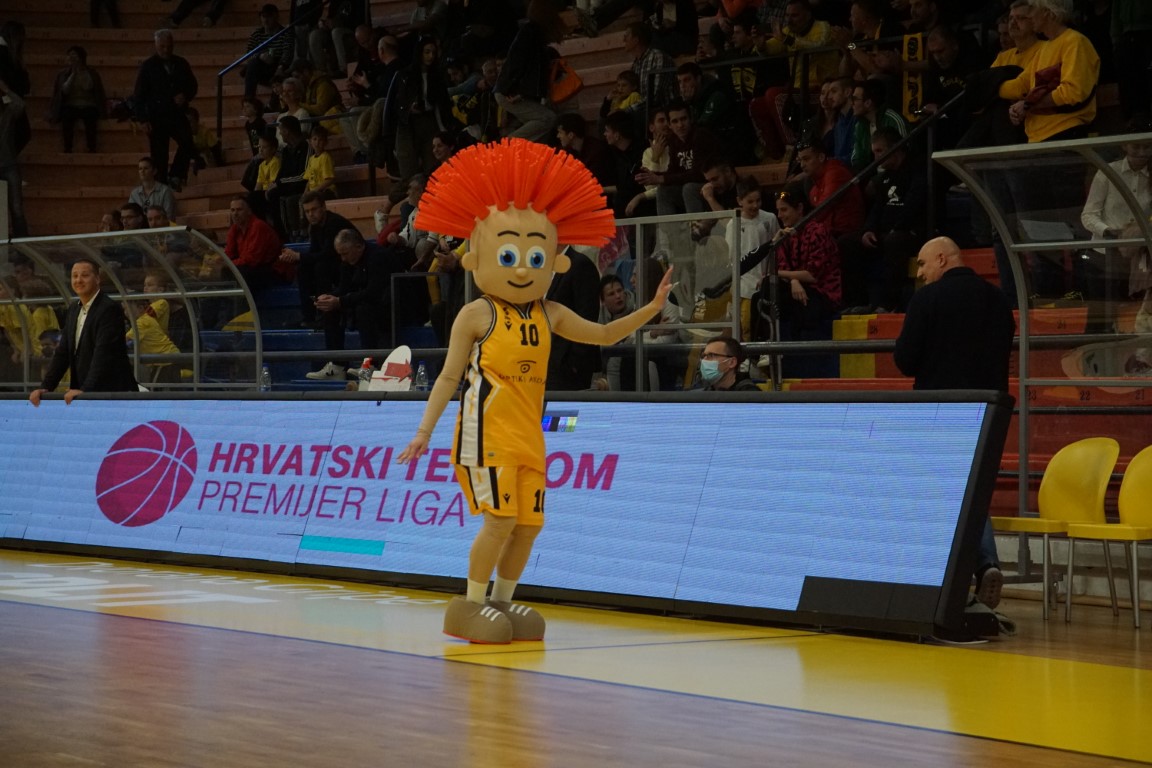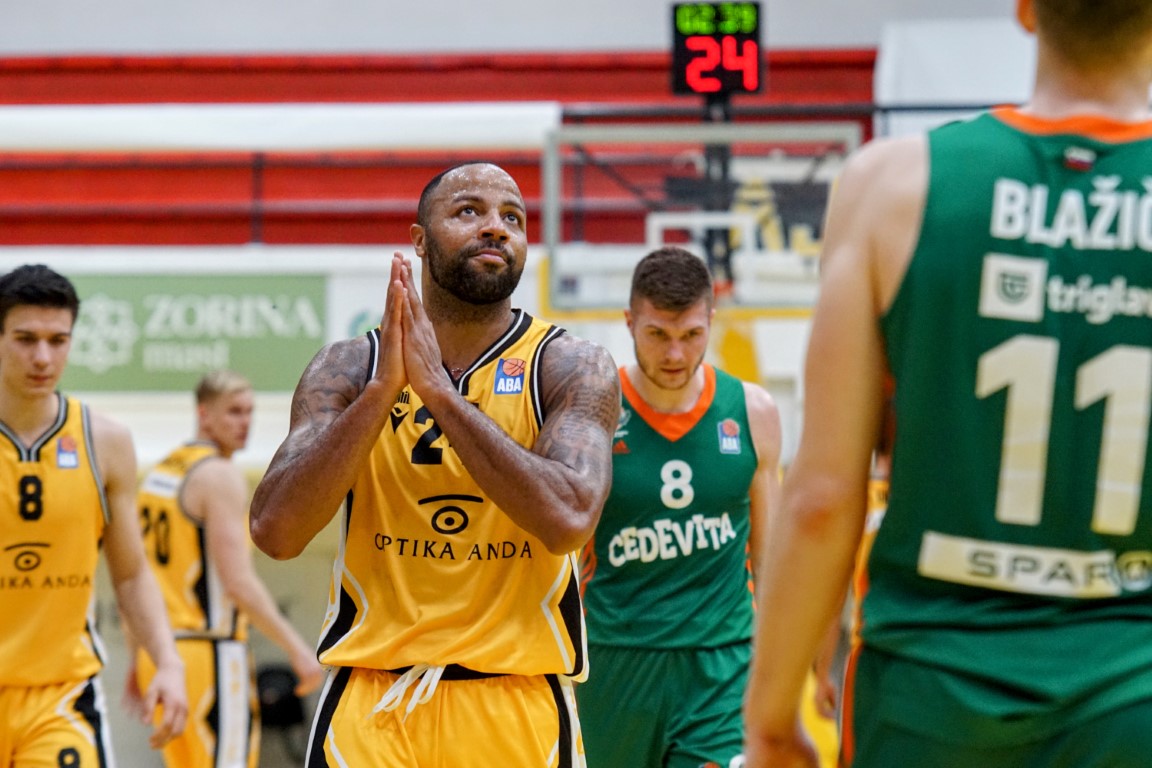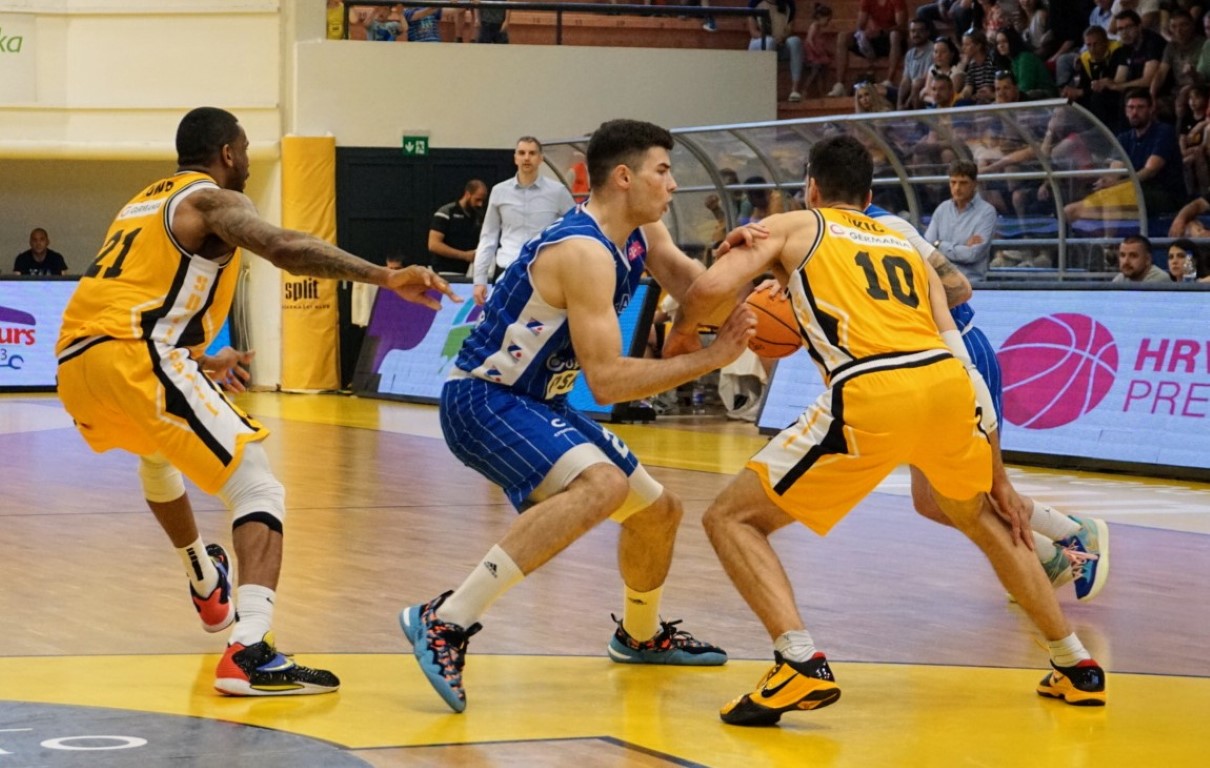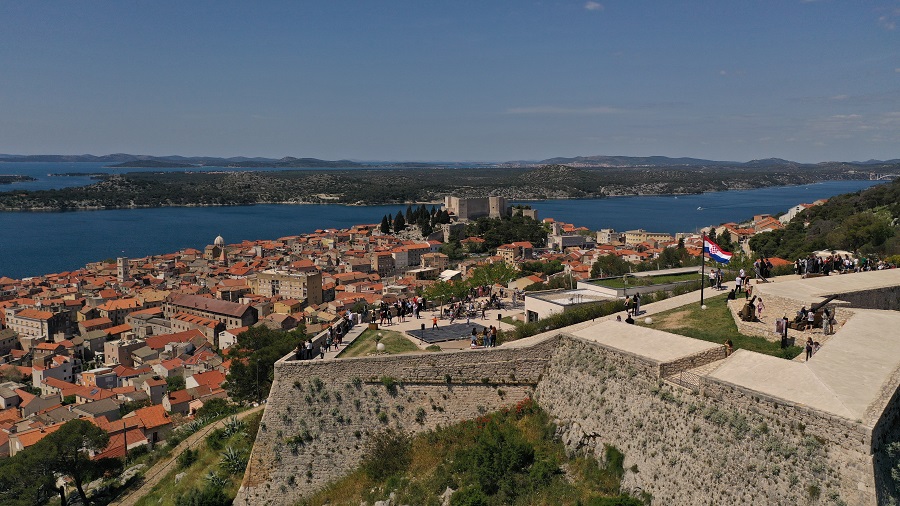Croatia National Team Joins Popular FIFA 23 Video Game!
August 24, 2022 - The Croatian Football Federation has reached an agreement with Electronic Arts, the global leader in digital interactive entertainment, and the Croatia national team will be included in EA SPORTS™ FIFA 23!
This July, EA SPORTS announced details of the new edition of the world's most popular football video game, EA SPORTS FIFA 23, which will be available from September 30 this year. The Croatian Football Federation proudly announces that all players will be able to select the Croatia national football team, reports HNS.
"We are extremely happy that we have reached an agreement with EA SPORTS regarding the inclusion of the Croatia national team in FIFA 23. We know that players around the world, and especially Croatia fans, have been wishing for this kind of news for years, and I am glad that they will now be able to play FIFA with their favorite team in the most beautiful jersey in the world. This is an important step forward by HNS for the younger population and video game fans, and we will work in this direction in the future," said HNS president Marijan Kustić.
HNS thus became one of 300 individual licensed partners in the game, through which more than 19,000 athletes in 700 teams, 100 stadiums, and 30 leagues from all over the world are available. In addition to the best clubs and national teams, players can also choose from some of the most famous competitions in the world, such as the UEFA Champions League, UEFA Europa League, UEFA Conference League, Premier League, Bundesliga, LaLiga Santander, CONMEBOL Libertadores, and CONMEBOL.
"We are delighted that the Croatia national team has joined the EA SPORTS family and will be available in FIFA 23," said James Salmon, Marketing Director at EA SPORTS FIFA. "The inclusion of this nation will allow us to continue to provide fans with an authentic and rich interactive football experience in FIFA 23 and beyond."
Players can join the EA SPORTS FIFA community on Facebook and Instagram or follow the @easportsfifa Twitter account.
To follow the latest sports news in Croatia, follow TCN's dedicated page.
North Croatia and Norway Cooperating in Converting Solar Energy into Electricity
ZAGREB, 23 August, 2022 - The One Sun Connecting North and South project aimed at increasing the production of electricity from solar energy in public sector facilities in Croatia was presented in Koprivnica on Tuesday.
The project is estimated at €1 million, of which €853,681 is in grants from the Financial Mechanism of the European Economic Area (EEA) and the Norwegian Financial Mechanism. The project will result in estimated annual electricity production of 981.87-megawatt hours (MWh) and a reduction in annual CO2 emissions by 155.72 tonnes.
The implementation of pilot projects to install integrated solar power plants on 29 public buildings in 16 cities and municipalities in Croatia will directly increase electricity generation from solar energy and result in a reduction of CO2 emissions. These facilities include schools, kindergartens, colleges, sports halls, and other public buildings.
Koprivnica Mayor Mišel Jakšić (SDP) underscored that the idea of installing solar panels began even before the current energy crisis.
A representative of the Norwegian Embassy in Croatia, Homma Latif, said that Norway is pleased to be a partner in this project, stressing that the war in Ukraine and climate change are increasing the risk of an even stronger energy crisis that can be resisted by an accelerated green transition.
Connecting with donors, in this case with Norway, is extremely important, a representative from the Ministry of Regional Development and European Union Funds, Mislav Kovač, said. "We are not only receiving funds from Norway, but this is also a transfer of the know-how and experience, which are equally important," he added.
Director of the North Regional Energy Agency Ivan Šimić explained that as many as 18 partners are involved in this project.
City of Varaždin Withdraws Enforcement Order against Varteks
ZAGREB, 23 August, 2022 - The City of Varaždin has decided to withdraw its enforcement order against the Varteks local clothing manufacturer in order for the company's accounts to be unblocked so it can pay its workers their wages, the city authorities reported on Tuesday.
On 11 August, the authorities of this northern Croatian city activated a debenture for Varteks's debt of HRK 1.3 million after the management board chairman Tomislav Babić resigned.
In the meantime, an inter-party council held a meeting, and following his consultations with the council, Mayor Neven Bosilj (SDP) decided to withdraw the decision for the enforced collection of Varteks's debt.
According to Bosilj's explanation, some of the receivables have been paid back to the city, and the authorities have also taken into consideration the whole social situation and decided to give up on the enforced collection of claims and enable the company to continue doing business.
The mayor said that he was glad to see that the inter-party council had shown understanding for 850 workers on Varteks's payroll.
The president of the Workers' Council and a member of the Varteks Supervisory Council, Božica Čiček Mutavdžić, recently informed the public about the difficult situation in the factory after the Tax Administration and the City of Varaždin blocked its account to collect claims, today thanked the mayor for the latest prompt decision.
According to her, Varteks has been recording an increase in retail sales compared with 2019, the year before the coronavirus crisis, which also affected its business. She noted that production capacities are filled until the end of the year and that there is interest from international brands for cooperation.
NGO Calls on gov't to protect islands of Goli Otok and Sveti Grgur
ZAGREB, 23 August, 2022 - The Documenta - Centre for Dealing with the Past NGO called on the government to protect the islands of Goli Otok and Sveti Grgur and presented a virtual guide through the history of prison camps on the occasion of Europe-Wide Day of Remembrance for the Victims of All Totalitarian and Authoritarian Regimes.
It is concerning that after the decision on the preventive protection of the island of Goli Otok in 2019, further devastation of the remaining buildings continues. We have again called on the Ministry of Culture and Media to allocate funds for the creation of a conservation study and protection, Documenta said on Tuesday.
Documenta wonders where the educational programmes will take place if the ruins of the prison camp become dangerous for visitors.
Also, ahead of Remembrance Day, Documenta, the Friedrich Ebert Stiftung Dialogue SOE office in Sarajevo, and the Friedrich Ebert Stiftung Zagreb office for Croatia and Slovenia on Monday presented the new, expanded edition of the virtual guide to the history of the Goli Otok prison camp.
The director of the Friedrich Ebert Stiftung regional office in Sarajevo, Ralf Melzer, at the presentation underscored the importance of critically dealing with the past based on scientific research.
Deputy Head of Mission of the Federal Republic of Germany in Croatia, Harald Seibel, visited Goli Otok for the first time and said more should be done to preserve the memory.
This island is available to everyone, but visitors can find very little information on what happened here, Seibel said.
Left-wing politics must sweep its own front porch first
The director of the Zagreb office, Sonja Schirmbeck, said she considered critically facing the topic of Goli Otok very important for two reasons.
Firstly, we as the political left must sweep our own front porch first and critically deal with the crimes of the left-wing politics, she said.
Secondly, she added, this topic is important because the discourse on the period of Tito's reign is much more ambivalent in the domain of memory politics than the discourse in the 1940s or 1990s.
Piletić: Government has Seen Pensions are Not Adequate
ZAGREB, 23 August, 2022 - Labour and Social Policy Minister Marin Piletić said on Tuesday that the government has seen that pensions are not adequate, which will be dealt with through the National Recovery and Resilience Plan, and he announced a package of aid measures for the autumn as well as one-off payments to pensioners.
Speaking about the impact of inflation on pension allowances, the minister said that they had increased by slightly more than 10% since 2019 due to inflation and with such pension indexation.
"Given the rise in prices in the second half of 2022, we expect that as of 1 January, the adjustment will also be significant compared to this 6.18%, but regardless of pension indexation, the government has seen that the amount of pensions is not adequate and through the National Recovery and Resilience Plan has committed itself to raise the lowest and family pensions," Piletić told the RTL television.
The minister also said that with the autumn package of measures and interventions, the government wanted to make it easier to weather the autumn and winter part of the year. It will do this by providing additional one-off payments to pension recipients in order to take care of socially at-risk citizens who are beneficiaries of the guaranteed minimum benefit.
Also, they have already prepared a number of job-keeping measures and measures for supporting businessmen.
Asked what they are specifically, he said they included all that had been good and useful.
If we are talking about the energy aid for pensioners, we have a solution that we can prepare very quickly, put on the table, and if the government agrees, aid pensioners with lower incomes, Piletić said.
Lika County Looking After 670 Ukrainian Refugees, 100 Find Jobs
ZAGREB, 23 August, 2022 - So far, 670 Ukrainians, who fled the war in their country, have found shelter in Lika-Senj County, and 100 of them have already been employed, mainly in the hospitality sector.
On Tuesday, a meeting was held between the Ukrainian Embassy, the associations of Ukrainians who are currently staying in the City of Gospić and the local authorities about possibilities for finding employment in this central Croatian region.
County Prefect Ernest Petry said that about 100 Ukrainians were already hired by local businesses.
Petry said that over 100 school-age Ukrainian children continued their education in local elementary and secondary schools in this county.
He praised the Ukrainian kids for doing fine in the new schools.
Zadar County Development Agency called ZADRA NOVA and Europe Direct Zadar, in cooperation with the European Commission's Representation in Croatia and the Ukrainian Embassy, have recently prepared a Croatian-Ukrainian dictionary for school-age children in order to help them with their education in Croatia.
The 44-page dictionary, with over 130 entries about basic terms and numbers, is free of charge and can be taken over in the headquarters of Europe Direct Zadar. There is also an electronic version of the dictionary available online.
Student Car Builders Present Their Cars at International Event in Novi Marof
ZAGREB, 24 August, 2022 - Rimac Group Formula Student Alpe Adria 2022, a sports and education event bringing together 50 student teams from Europe, Asia, and Africa, started at the ST Rauš kart circuit in Novi Marof, in the northern Varaždin County, on Tuesday.
Students, future engineers from almost all European countries as well as Taiwan, Israel, and Oman, will present the cars they are building at their universities, and the cars will be judged by about a hundred experts from renowned world automobile manufacturing companies and Formula 1.
This is the second year Varaždin County and Novi Marof are hosting the event, which in only one year has become an official event of the international educational project "Formula Student", organised by the Varaždin-based FSAA association, with Rimac Group being its main sponsor.
Tibor Kezelj, president of the FSAA association and the event's main organiser, said that the organisers expect "excellent engineering, great cars, and an attractive event for all teams, visitors and sponsors."
"We are inviting everyone to visit and see the most attractive cars that can be seen currently in Croatia," Kezelj said, adding that luxury cars would also be put on display.
Rimac Group Formula Student Alpe Adria 2022 lasts until Sunday, 28 August.
Osijek Software City - Best Place on the Planet for Family Life
August 24, 2022 - Nathan arrived in Osijek from Arizona via Colorado and Prague. Not only did he find a job there, but also what he calls the ideal place for family life. The Osijek Software City movement is slowly, but surely coming to life.
As RTL writes, Osijek is a city where IT companies produce good software. Where do you acquire the necessary knowledge and skills for that? Where are the educated and motivated workers employed in quality and promising companies? This is how the objectives of the Osijek Software City project were presented, were they achieved?
Ten years from the first vision of Osijek as a regional IT center, and seven years until the first company in the IT park. The story of Osijek Software City unfolded slowly.
“It went slowly and it was difficult, but now it's going faster and faster”, Denis, one of the initiators of this story, told RTL. Better cooperation with universities will create the necessary IT specialists and scholarship programs with the City and the County that will attract young people.
“For us, this current pool of young people is no longer enough to turn Osijek into a true center of the IT industry, and we will really need to attract and import a lot of foreign students”, says Denis Sušac, director of the IT company.
Nathan arrived in Osijek from Arizona via Colorado and Prague. Not only did he find a job there, but also what he calls the ideal place for family life.
“Osijek could be one of the best cities on the planet for family life”, said Nathan Chappell, a developer.
The family spirit is present in the workplace, and his family is also helping him learn the Croatian language.
Ivana, on the other hand, studied languages, but after finishing her studies, she felt that it was not her life's calling.
“And then, little by little, I started poking around in IT to see what was there and what I was really interested in and I came across this testing”, said Ivana Belak, software tester.
She didn't want to leave Croatia and rather wanted to find the job she desired here, and that, she says, came true.
“We think that today young people can live very well working in Osijek, without leaving, and this trend of going to Ireland, Sweden, Germany is slowly coming to a halt”, claims Sušac.
The number of IT people in Osijek is growing. The goal of recognising Osijek as a city where IT experts live and work is becoming closer, and without their skills life is almost unimaginable today.
For more, make sure to check out our dedicated Lifestyle section.
KK Split is Up for Sale (Again)
Why it is not worth anything. Ništa. Not a single Lipa! (EDITORIAL)
Split, 23.08.2022 - The City of Split is again trying to find an investor for the Basketball Club KK Split. This time it is official. Read the invitation to tender here.
In the tender, the City of Split states the value of the shares which it offers for sale at 4'000'000 EUR, that's the shares it wants to sell, so they value the club at around 6 Million Euro, which is the amount at which all issued shares were handed out.
Our contributor Burak Canboy had considered to invest into the organization in 2013/2014 and has been covering the club for TCN during the last two seasons.
Here is his personal opinion on the value of the club and the politics going on right now.
EDITORIAL:
Let me say it out loud first. Those who don't want to listen to arguments may call me a traitor, a rich foreigner who doesn't understand Croatia, they may want me banished or may crucify me at the next game and then those who actually like to deal with the matter will hopefully read this opinion. In the current state, KK Split is not worth anything. Ništa. Not a single Lipa!
Now it is out. So, why do I believe the team that dominated the late eighties and early nineties, the big Jugoplastika Split that was officially named the best European club of the 20st century by FIBA is currently not worth anything? The club that resides at Gripe, a gym that was built mostly by the hands of its members. In a mecca of basketball that hosts the biggest trophies and most valuable jerseys in the "yellow salon". The club that is quite correctly called one of the most successful clubs in the history of European basketball. Winning three consecutive EuroLeague titles, two Korač Cups plus 3 Triple Crowns, 6 Yugoslav Championships, 5 Yugoslav Cups, 5 Croatian Cups and 1 Croatian Championship. A club that competes in the prestigious ABA League and plays for championships in the Croatian National League. A club that created greats like Branko Radović, Ratomir Tvrdić, Toni Kukoč, Dino Rađa, Žan Tabak, Petar Skansi, Velimir Perasović (please forgive me that I did not list everyone, it is a very long list).
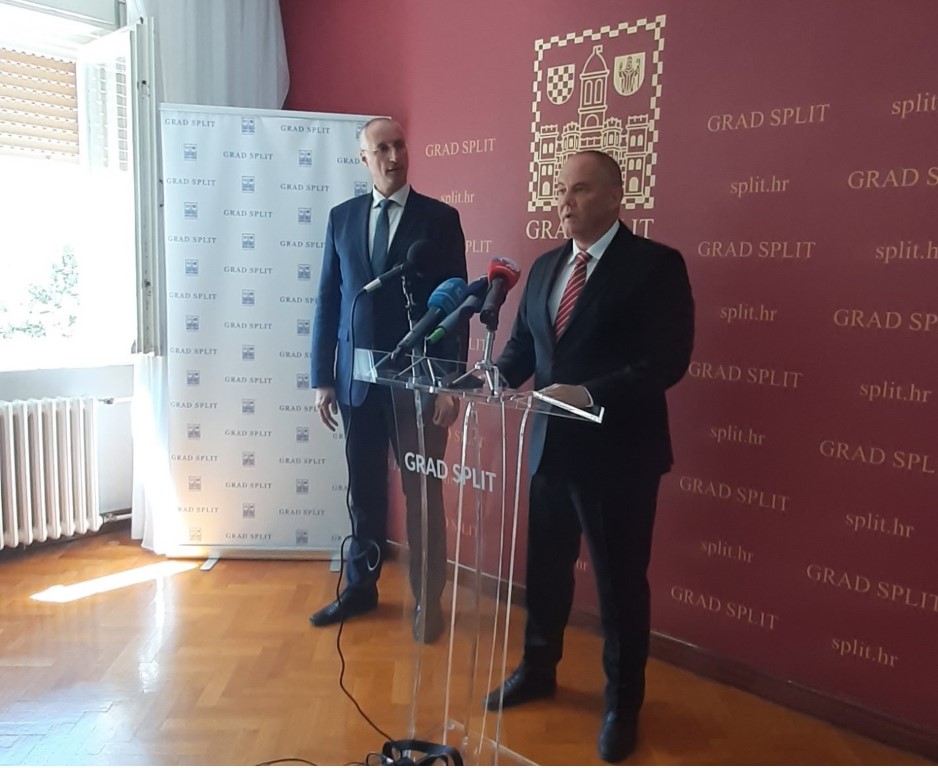
Mayor Puljak and Deputy Kuzmanić presenting their ideas for KK Split (Photo: Grad Split)
Well, in the world of business there is a word for value that cannot be measured by the sum of its assets. It is called "goodwill" or "value of intangible assets". When you look at the world's largest companies with high goodwill, Coca Cola used to be the example in the nineties, today it is companies like Microsoft and Amazon that mainly consist of value which stock markets assess because people are willing to pay more per share than the sum of assets listed in their balance sheets, divided by the amount of stocks issued. Where there is goodwill there is also the opposite. Companies worth less than their sum of assets. You hear stories of companies given away for a dollar sometimes but more often than not, those companies are not even worth the dollar. They disappear more or less silently because nobody wants to risk renovating, restructuring and rebuilding such companies.
Now that I have given a short excursion to the business world in the US, let's get back to Europe, the Balkans (or as some people like to call it Southeast Europe nowadays), Croatia, Dalmatia, Split, Gripe, KK Split. There is a reason why I am listing them in this order. but all of these have a reason why the club is not worth anything. Ništa. Not a single Lipa!
European Union:
Let's start with Europe. During the Global Financial Crisis of 2008, which became a european financial crisis in the years after and lead to Greece being put under financial supervision (which just ended a few days ago btw.), some people started to wonder how football clubs and to some extent also basketball clubs in Greece could have such huge budgets if the country is basically bankrupt. Clubs like Panathinaikos, AEK, Olympiakos and PAOK were very successful in Europe and globally known to be paying very good salaries, frequently bringing in players from the NBA or stopping players from going there.
This was not just an exclusively Greek behavior, but also quite normal in Italy, France and Spain and obviously also in most other european countries, but they are not so well known for their well paying leagues. The spotlight was just shining brightest onto Greece, while Europe wanted to stop waste of taxpayers' money.
CEDEVITA: Money goes to Slovenia now (Photo: Burak Canboy)
The clubs and local governments had become so intertwined that big parts of the clubs' budgets consisted of money being transferred from the governments to the clubs declared as "sports education", "funds for sports equipment ", "youth support", "tourism support", "business growth support", "gym maintenance " and many other creative ways. While all these can be very much in the interest of the public and are surely worth spending public money for, in most cases that money was not used for that purpose, but for the running expenses of an internationally competing professional team. This practice has been deemed illegal by the European Union and is considered a "preferred subsidizing of business". Now, the City of Split has been very creative as well in the past years, but it is quite obvious that continued participation in the ABA League and playing for championships in the croatian league would not have been possible if all salaries, participation costs and travel expenses of the professional team had had to be paid for by income from TV broadcasting rights, ticket sales, sponsors and other revenues such as sale of merchandise. During the last years the club had over and over accumulated losses that the city had to cover by increasing the capital of the club. Now, creative as it may be, in the end it is the exact behavior that the EU wanted to stop. Now, if the club did not have money coming from the city, it would be bankrupt. Worth nothing. Ništa. Not a single Lipa.
Balkans/Southeast Europe:
Yugoslavia the former world force in basketball is shattered. Romania, Bulgaria, Albania were never really big. Bosnia & Hercegovina 45th in the world, Kosovo 71st and North Macedonia 52nd play no large role, Croatia as described later is in a free fall. Serbia (4th), managed to re-establish some of the former glory, Montenegro is a recent positive surprise (25th) and Slovenia is a rising star (3rd), but in general basketball business at successful clubs is mostly run by dubious owners/presidents or player agencies often enough operating in dark grey areas of the law and federation regulations (surely nobody wants to see KK Split becoming a front for some completely illegal business). In countries that are non-EU, strong government funding is still predominant. And if you watched the finals of this year's ABA League between Partizan and Red Star you got to see how some fans like to use the game to show how ugly and disgraceful sports can be.
Extra value for the club: Ništa. Not a single Lipa.
Croatia:
The national team could not even pass a group with Finland (35th in the world) and needed 2 overtimes to barely beat Sweden once (51st in the world !), and now rightfully has to play in a group with Switzerland (world's 60th) and Austria (61st) to re-capture just the opportunity to qualify for the World Cup in 2025.
Zadar and CIBONA on the floor? (Photo: Burak Canboy)
KK Split's competitors in the national league
- CEDEVITA, has seen the big money move to Slovenia.
- CIBONA is clinically dead, pretty much bankrupt, kept alive with tax payers' money and/or lack of transparency.
- KK Zadar is clinically dead, kept alive with tax payers' money and/or lack of transparency.
Most other clubs in the croatian league are - yes you guessed it right - clinically dead, kept alive with tax payers' money and/or lack of transparency.
Apart from that, favoritism amongst coaches, referees and other officials more often than not stand in the way of effectively developing national talents.
Extra value for the club: Ništa. Not a single Lipa.
Dalmatia:
Turizam, Turizam i Turizam. Do I need to say more?
Croatian Title Trophies. Too far to reach? (Photo: Burak Canboy)
Dalmatia lacks large global or at least international companies that can use a basketball team as their "travelling signpost". When you look for big clubs in Europe you will find Efes, Beko, Armani Exchange, ALBA as sponsors carrying weight for successful clubs or you find teams like Real Madrid, FC Barcelona and FC Bayern Munich profiting from the groundwork, their football clubs have done in finding sponsors and building a name for the organization.
Lack of potential large sponsors, preoccupation with a single economy. Extra value for the club: Ništa. Not a single Lipa.
Split: Politics and Hajduk
The City of Split created an unprofessional presentation for the tender (no assets listed, very short time given for due-diligence, no contractual obligations listed, no own concept or ideas presented). So either some back-room deal is already made or the responsible people think they can find an idiot who is willing to buy the pig in a poke, or as they say elsewhere, buy the cat in a sack.
Then you should not forget that there is already a major power house in town. Football is King and in Split the King is called Hajduk. Instead of trying to benefit from the big brother, a separation is being forced and Torcida named unwanted guests on Gripe.
Lack of potential large sponsors, presence of an overwhelming football power means a lack of positive future paired with involvement of politicians in a business. Extra value for the club: Ništa. Not a single Lipa. (For the involvement of politicians this number should be very large. But negative!)
Efforts in Vain on Gripe? (Photo: Burak Canboy)
Gripe:
Despite wonderful gyms being available in the city like the two larger gyms on Gripe, the small court under Spaladium Arena, the gym at the Pool on Poljud, Spaladium Arena and probably others I don't even know, KK Split continues to practice at Gripe. The home court advantage is canceled out by the limited usability of the space and the poor condition of the building. It is not possible to have multiple teams practice in the gym at the same time. The space in the back of the gym that Dino Rađa helped to renovate a few years ago is good for individual training but overall the layout of the gym is miserable for a basketball club with ambitions.
The building's energy efficiency is terrible, operating costs, high. Existing tenants have been there forever and are probably paying below-market rent.
If the city does not spend considerable money to renovate the gym and give a reasonable long term concession, the extra value for the club: Ništa. Not a single Lipa.
Unless we go back to the plans of Ivo Baldazar or Željko Kerum to sell all or part of Gripe to some real estate investment company and to have them take care of the club in return. But still the value of the club remains: Ništa. Not a single Lipa.
Yellow Salon:
This is a cultural item. It cannot be transferred to a new owner. It has value as a museum. It has value for the city, for the citizens, for the players, for the employees of the club. It should be moved to a place where everyone has access to it. It cannot and should not be transferred to an investor because Cups and Medals cannot be bought.
Value for an investor: Nothing. Ništa. Not a single Lipa.
K.K. Split:
The club has a very long history of not being able to operate profitably. The last administration was not long ago and not much seems to have changed since then when it comes to control, supervision and direction. A long history of mismanagement and even what may be called accepted corruption and embezzlement when it comes to how talented players were treated. Surely Dragan Bender's and Ante Žižić's move to Maccabi with Nikola Vujčić were not "kosher" but nobody was interested in suing for damages. While thinking about things that went missing: the whereabouts of the Korač Cup that disappeared from the Žuti Salon is still not known. Is it?
Shannon Shorter praying for help (Photo: Burak Canboy)
K.K. Mislav a small club without a gym in Podstrana just had the second player go abroad (Tomislav Buljan just moved from Zadar to Spain after Stipe Jelić had already left for Italy in 2019). How many talented players has K.K. Split produced that went abroad. Let's say there are more than Perković and Perasović, but how much money has been paid to the club for players leaving during the last 20 years?
How many young players in the current roster have long term contracts that may lead to income from a sale at some point in the future?
Sorry to say, but the only value in the club is the right to play in ABA League and the croatian first league. But again, what is that worth without the city's subsidies?
Yes. Nothing. Ništa. Not a single Lipa.
Opportunities:
Now, when could an investment into the club make sense? When the city and all people involved understand that the value of shares is nothing. Ništa. Not a single Lipa.
Once that is understood, the company can process the opposite of a recapitalization, a capital reduction. When all existing shareholders have their shares reduced to a value of close to zero or zero, and all existing debts have been cleared, then you can start a fair partnership by raising new money. If the city then wishes to have a 25%+1 controlling share, it will need to invest at the according rate, as a new investor would. Twice as much, if the city of Split wishes to keep 50% of shares.
A sample mission & vision for the club was already gifted to the club and the city in 2014. Look for yourself how much of it has been adopted and how much more needs to be done before you can call the club valuable: KK Split Mission & Vision 2014
"Grado" and his boat "Žuta ljubav"
To give a more local comparison of how the City of Split calculates the value of the club, I will explain by using the example of a boat and a fisherman. Now, at some point in the past, someone sold a boat named "Žuta ljubav" to a local fisherman who wanted to take tourists to beautiful bays that you could only reach by boat. The fisherman was called Grado because he could exactly tell the temperature to the tenth of a degree. The boat was old but it was a wonderful boat. It used to be quite a beauty back in the days. The design had aged well and it was still floating. It could sail near the coast and even a little further out but no longer in blue waters as it once did. "Žuta ljubav" needed a lot of crew to operate and a lot of maintenance, because former owners had taken away important parts and just replaced them with whatever they could find for cheap. Every year, the boat needed an expensive crew to operate, it needed new sails, the engine needed to be repaired, leaks needed to be filled and all moving parts needed to be serviced. The berth needed to be paid. And despite all the work time and money put in, it never looked as good as it once did and always barely stayed afloat because Grado could not afford a full renovation. Even though the boat used to drive people around and conducted business, every year the owner needed to add money from his own pocket. Sometimes more, sometime less.
Tomislav Buljan: From Podstrana to Zadar to Spain (Photo: Burak Canboy)
After years of losing money Grado became tired of taking care of "Žuta ljubav" and asked his oldest son if he wanted to have the boat. He declined, so did his second son and his youngest son. They didn't tell their father the real reason because they were afraid he may be disappointed and die from sorrow. The oldest used his family as an excuse and said that he needed to keep his stable job. The second son said he could not swim and the third wanted to become a musician. So one day Grado took his sorrow to his neighbor and friend Stino. Stino who was known to be brutally honest, gave him a glass of Orahovac and a big glass of cold water. "Enjoy the Orahovac" he said, "you will need the cold water later." "Why?" asked Grado. "Well, my dear friend. Love has made you blind. You have spent so much money on your boat during the last years, and you think it is worth a lot, because you have spent so much time and money on it. But today after almost 6 million Euros spent, it still barely floats, it still costs you a fortune to operate and maintain and even if you didn't use it, you would still need to pay for the berth. Your sons love you too much to tell you, but you managed not to sink the boat, instead you have sunk all your money. No-one will buy your boat, because it barely stays afloat and doesn't make any profit. My friend, when you open your eyes, you will understand that the value of your boat, even though it floats, is zero. Nobody who knows the slightest bit about boating would buy it. If you paid someone to take it, maybe you can get rid of it. But if you ever want to make money selling it, you need to first either spend a fortune renovating it or at least make it profitable. So profitable that you can easily pay the crew, the maintenence, the berth, everything and have money left at the end of the season so you can enjoy a long winter without having to work. Then my friend it will still be hard to sell an old boat, but at least it will be a profitable business. But now it is not worth anything. Ništa. Not a single Lipa." Grado finally understood and when the truth arrived, it hit him like a truck, but at least he still had the small joy of a cold glass of water to look forward to.
Still don't believe me that the value of the club is nothing? Ništa? Not a single Lipa? Well, just go ahead and ask any of the employees of the club to reduce their salary by 50% and give them the rest of salary in shares. Or you could even ask Mayor Puljak and Deputy Kuzmanić who are trying to sell the shares, if they would agree to have their salaries in the next 4 years paid in shares of K.K. Split instead of money. I dare anyone to come forward and say that they would prefer to be paid in shares of KK Split than in Kuna. Guess how many would agree to that and what they would probably say: The shares are worthless, because the value of the club is nothing. Ništa. Not a single Lipa!
The views of the author are not necessarily the views of TCN.
August is the Right Time to Explore Šibenik's Fortresses!
August 23, 2022 - Looking for an example of a Croatian destination with a masterclass in combining heritage and tourism - meet the fortresses of Šibenik.
I often get asked for advice on tourist destinations in Croatia – and that is the easiest one for me to answer, as my top recommendation has not changed in 5 years since my first extensive visit - Šibenik!
You can read about my fabulous day in 2017 when the whole family was stunned by the city's magnificence and offer in Croatia's Most Underrated Destination? Stunning Fortress Šibenik Has It All.
The Šibenik fortresses were truly an inspiration for anyone learning how to maximize quality tourism and heritage.
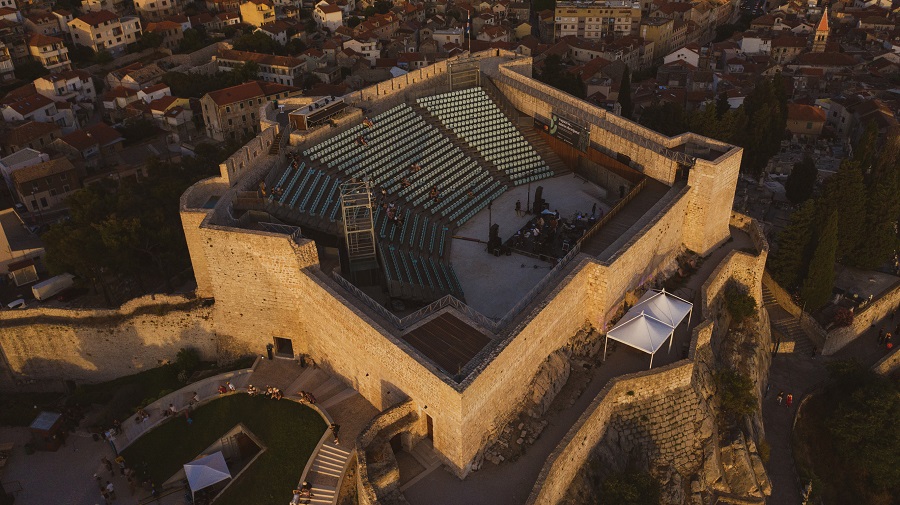
In addition to being surrounded by two national parks and home to two UNESCO World Heritage Sites, Šibenik is a Dalmatian gem for a long vacation or quick getaway. Recently, the meeting place of history, culture, music, and gastronomy has turned from a sleeping beauty into a lively city in recent years.
Thanks to its rich cultural offer, the city has greatly surpassed its former tourist image of a "sun & sea” destination and has found itself on the map of visitors looking for culture and entertainment - thanks in large part to the open stages at the revitalized St. Michael’s and Barone Fortress. The newest addition to revitalized fortification monuments is St. John’s Fortress, the largest and highest land fortress in Šibenik opened in June this year. These three are gathering places for history buffs, music connoisseurs, and those who simply love a good rhythm, as well as technology enthusiasts.
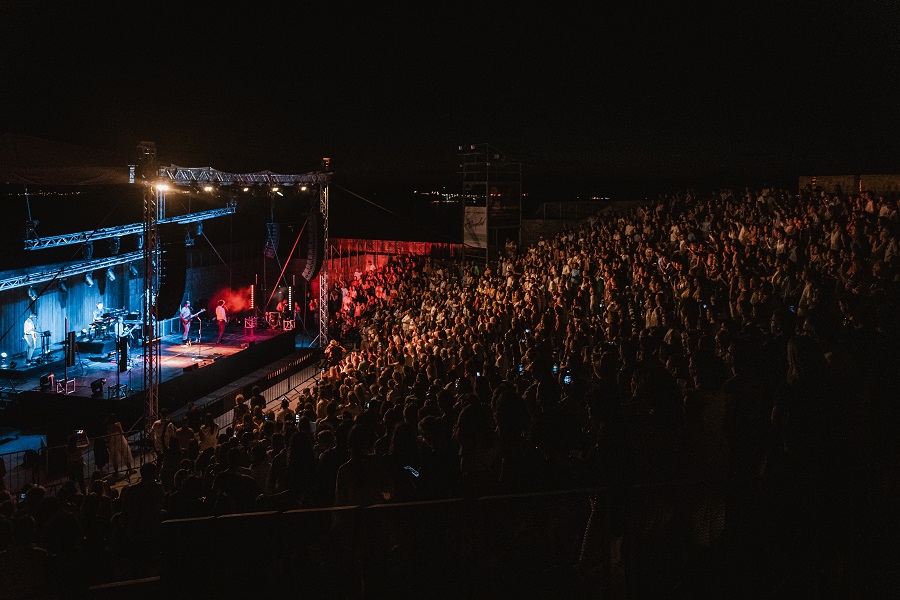
Since 2014, St. Michael’s Fortress hosts numerous concerts and dance performances at one of the most prestigious outdoor stages in the region. If you want to find out why come to one of this summer's concerts. Past concerts of Lorde, Jack Savoretti and King Gizzard & the Lizard Wizard, and the upcoming Kings of Convenience are just a part of this summer’s lineup. Also, they are a great addition to the past performers' list - Bryan Ferry, Anna Oxa, Michael Kiwanuka, Gregory Porter, Skye & Ross (from Morcheeba), Jacob Collier, Kruder&Dorfmeister, Roisin Murphy, and many, many Croatian artists.
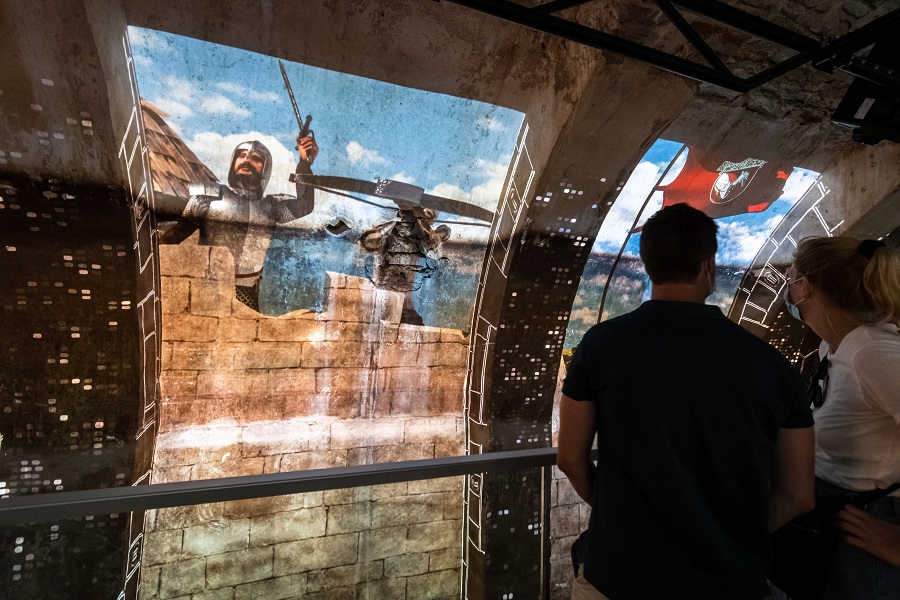
Technology enthusiasts will enjoy the underground part of the fortress, i.e., the two cisterns from the 15th century, which, just like a time machine, take visitors to past centuries thanks to 3D mapping technology. Projections cover over 70% of the surface, which is curved in parts, which makes this undertaking the first of its kind in Croatia. By the end of the year, St. Michael’s Fortress will receive a new exhibition display and interactive content that will show the origin of an idea to place an open-air stage at the oldest Šibenik fortress. All these spots can be explored using an audio guide.
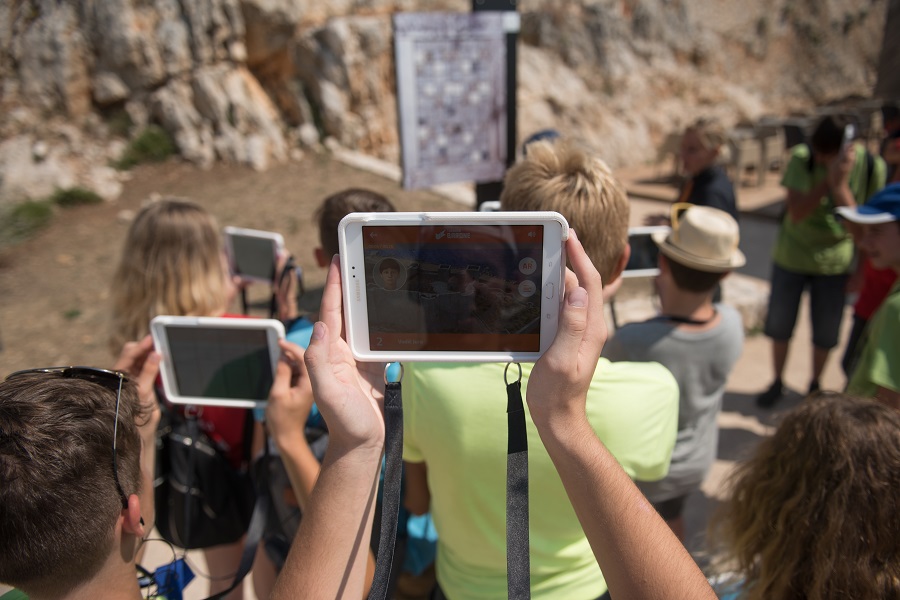
The smallest of them - Barone Fortress, has been leading its new life since 2016 as a more intimate summer stage and summer cinema under the starry sky. It is open all year round and a great place for that first-morning coffee or an evening glass of wine with one of the best views in the city. Of course, after you discover all its secrets through an augmented reality tablet that allows you to witness the angry Ottoman attacks during the greatest battles for Šibenik.
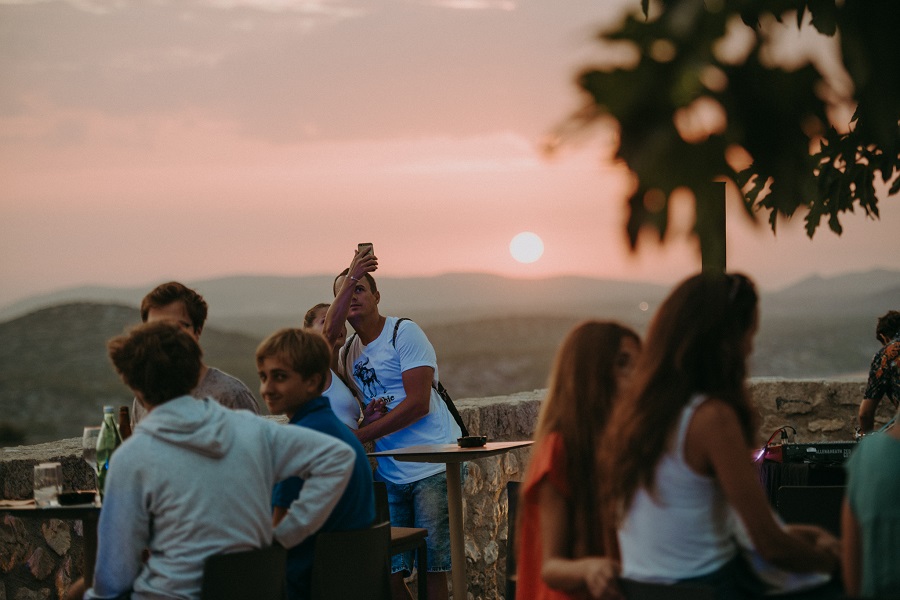
It was during this time and for this reason that the St. John’s Fortress was built. Recently renewed, the largest and highest land fortress in Šibenik opened in June this year. It consists of two parts – 'star', a fortified southern part of the fortress, and 'pliers', an outer fortification in the northern part.
The educational campus is situated below the so-called pliers, the northern part of the fortress. The campus is equipped with interactive classrooms, bedrooms, and conference rooms. The campus is intended for student groups, young experts, and artists who are coming to Šibenik for study visits or other educational purposes. This kind of space will also contribute to the development of educational tourism.
A short walk uphill is worth the while as the St. John’s Fortress is maybe the best photo spot in town! Fortress’ shop is placed in an old gun powder magazine; overlooking the west part of the town is a Tobruk-type bunker from Second World War. And yet, the fortress still has a lot of secrets to be discovered. One of them is the underground tunnel beneath the fortress (71 meters long, 2 meters high, and at places 5 meters wide) that is yet to be placed in function. The plans for the future also include implementing VR content that will offer a new, interactive, and fun experience for future visitors.
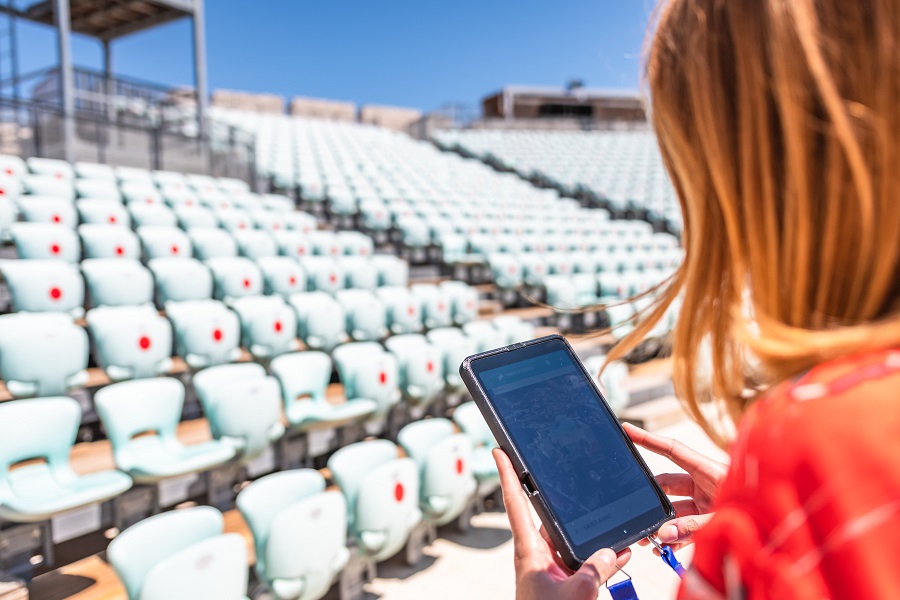
All these locations and their contents are available all year round, so it can be said that the revitalization of the fortresses also brought the revitalization of Šibenik and positioned the city as a hit destination and cultural hotspot that guarantees unforgettable experiences.
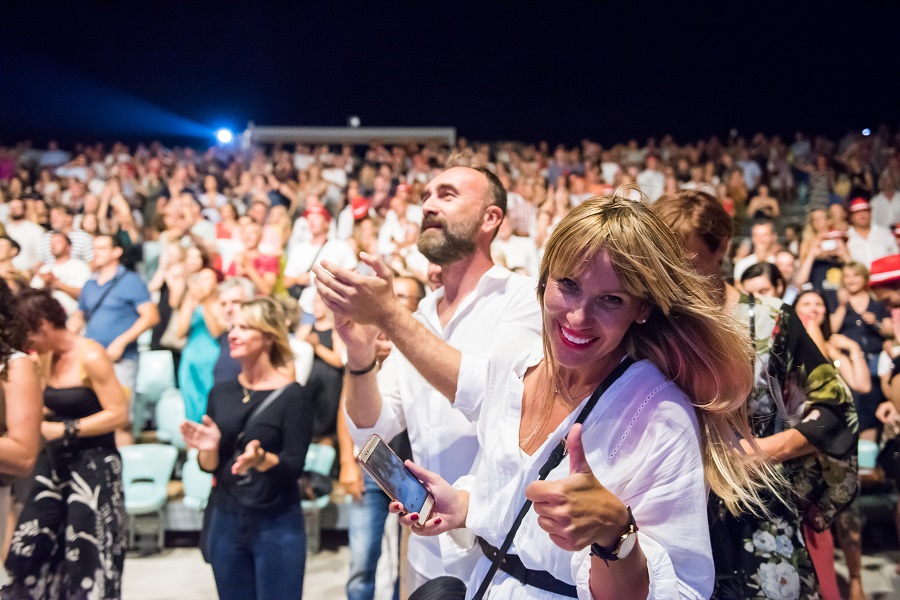
The newest addition to Šibenik's cultural scene is the House of Arts Arsen (named in honor of the Croatian artistic genius Arsen Dedić) officially opened in June 2021. From September to June, this venue is transformed into a cinema, concert hall, dance stage, space for presentations and exhibitions, workshop area - or anything your mind sets up upon! Thanks to a specific modular floor whose height can be adjusted to any need, the space transforms easily. This August House of Arts Arsen was a gallery, as it hosts an exhibition by one of the most important Croatian painters, Vatroslav Kuliš.
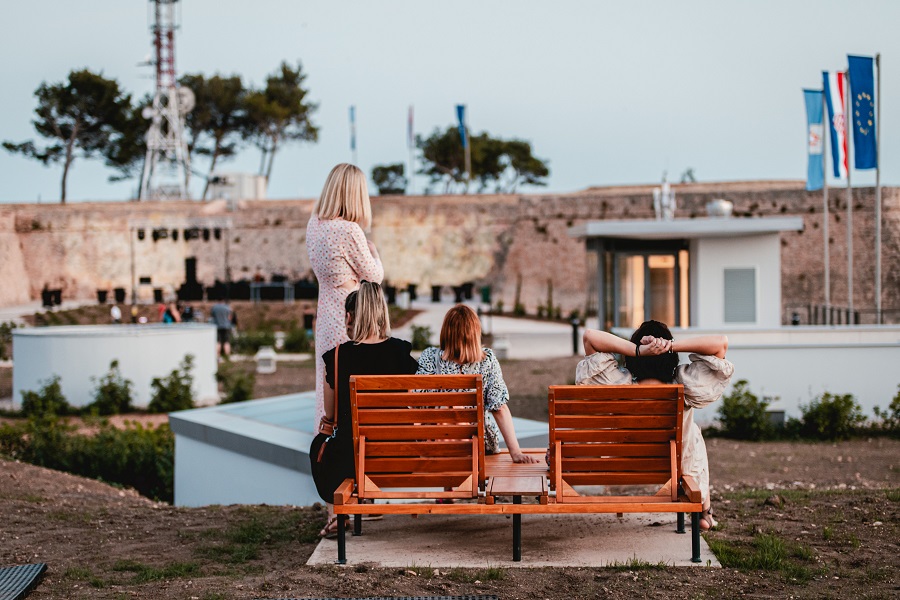
The easiest way to explore all these locations is with Mastercard, whose cardholders get many benefits throughout the year thanks to Mastercard’s partnership with Fortress of Culture. This public institution that manages the fortress House of Arts Arsen made sure that like-minded partners follow its every step in creating a fortress of good music, knowledge, and a new cultural audience.
So don’t lose any more time and visit Šibenik’s fortresses and see what’s all the fuss about.
You can learn more about the incredible Šibenik fortresses on the official website.
Learn more about this fabulous city with the Total Croatia Šibenik in a Page guide.


